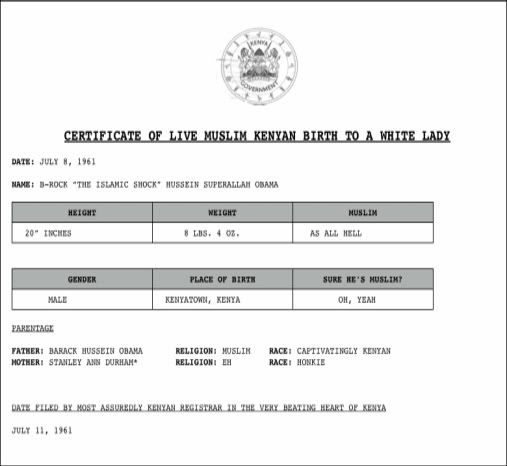Flagpins and apple pie
@
13:31
•
history,
identity,
Obama,
patriotism,
politics,
Singapore,
United States
•
0
comments
![]()
If you've been following world news, you must have learned about the 'controversy' surrounding Barack Obama's citizenship. Simply put, some people contend that he's Kenyan. Fortunately, Obama's official birth certificate has been produced and verified. Unfortunately, some of these people are demanding to see the original long-form certificate, which may or may not exist today, and that he produce various other records that he is not obliged to produce. Worse, someone found his purported Kenyan birth certificate.
If your memory of American politics extends further back to the presidential elections, you'd remember that Obama was also accused of being an Arab and of being a "Muslin".
So who or what is Obama, really? Let's settle this issue for ourselves by looking at his real ultimate birth certificate:
Convinced?
This is America, the famous "melting pot" of the world. And the issue of the president's identity causes such an unnecessary stir, despite proofs that he is indeed American. Perhaps he's not American enough, unless he's white?
Someone asked me a few days ago if I feel a greater identification with my country when I'm overseas. Yes, I do. It's the only thing that identifies me when people ask me where I'm from. Yeah, I wasn't born here and I spent 10 years growing up in another country. I got my citizenship only when I was 21. And, yes, it seems that I have plenty of complaints about Singapore. Heck, I might even want to live elsewhere.
But this is my country. Is there any use in pretending otherwise?
So what exactly is national identity, as many people are looking out for? How do you measure 'Britishness' or 'Frenchness? This seems to be a very relevant question in Europe, where various groups of immigrants have real problems integrating; or perhaps it is the various societies that have problems accommodating the immigrants.
Perhaps the question is, in an age of globalisation, do nation states still hold the same level of significance as before? I wrote some time ago that patriotism should be about solidarity with your countrymen and not about loyalty to the state. But why stop at your countrymen? Is it because of a shared history? Surely things that happened in the country before you were born don't affect your identity directly. Rather, their legacy forms part of the country's culture. Is it then a question of cultural identity?
This is where globalisation complicates things, and where size also matters. The world is both too small and too big. Today, we readily absorb elements of other cultures that the media exposes us to. At the same time, the particularities of the sub-national regions that we come from continue to differentiate us from fellow citizens from another region. Can we pin down what makes us identify ourselves as citizens of a country?
Does essence precede existence? Are people from a country because they share a common identity, or do people share a common identity because they are from a country?
Is it possible for a Singaporean to not be Singaporean enough?
I think many people's gut instincts would be to say "yes". Otherwise, why do they regularly try to whip up some sort of esprit de corps, or why do they disapprove of those who don't have it? Labels like "unpatriotic" and even "ungrateful" testify to some sort of assumption that you have to qualify yourself as a true citizen.
And why do people regularly assume that to be Singaporean you have to be of a similar mind in some things? Do practices, perhaps, confer identity?
What I know is that it suffices that I am from this country. When people ask me where I'm from, I tell them. No embellishments are necessary, and I don't feel obligated to paint my country in a good light. I am Singaporean because I live or lived in Singapore for a good part of my life and I carry a Singapore passport. Is that not enough?
Before the idea of the nation state was born, people were parochial. They identified themselves with the little regions that they lived in. The peculiar practices of a region might have differentiated its people from those who were from another region, but I doubt a lot of them thought much about how they must cultivate regional identities. People belonged to a region simply because they lived there. In these times, I think we should be moving back towards such a picture.
But perhaps we still can't let go of the early 20th century.


(0) Comments
Post a Comment